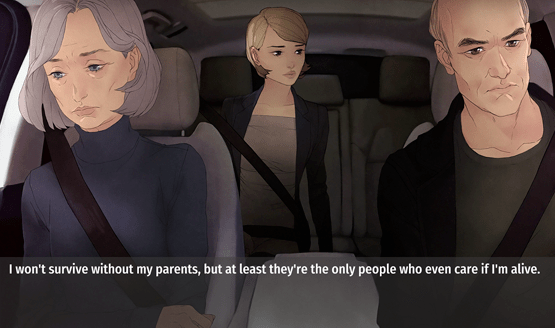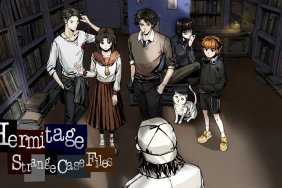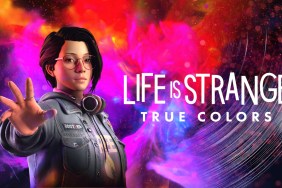There’s a lot in this world that sucks. There’s no two ways about that, but there’s also a lot of good. People—despite what many would have you believe—are not inherently evil, selfish, lazy, or any of the cadre of buzzwords that society puts onto them. Truth is, the world’s a lot more complicated than the simple labels that we like to throw on people and situations, yet these extremely polarized caricatures form the foundations of Little Red Lie’s nihilistic look at life.
Little Red Lie’s main mechanic centers on the lies that we tell ourselves and others every day. It’s a pessimistic look at the world, highlighting the characters’ lies in red. From things like answering “I’m fine” when asked how you are to making up excuses for why you haven’t been able to call. It even calls out the platitudes that we give to others. There’s a lot of red text to wade through, and it certainly gives one pause to think about all those little white lies that we tell in our daily lives, either to the people around us or in our own internal monologues.
A Tale of Two Liars
Sarah Stone and Arthur Fox form the backbone of Little Red Lie’s narrative. Sarah is a middle-aged millennial who has worked hard through her life, deserves more, and yet seems to get nowhere. She’s living at home, taking care of a dysfunctional family, and is generally miserable. Arthur is a rich, misogynistic asshole who rakes in money from the very people he hates and doesn’t deserve the lavish lifestyle that he squanders. He spends his time doing cocaine, raping drugged-up women, and feeding lies to the desperate masses in order to pad his own pockets. He’s also generally miserable.
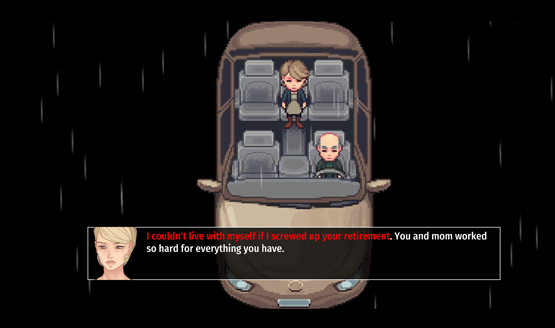
The story switches back and forth between these two polar opposites, and while Little Red Lie never gets overly political in nature, it’s clear to anyone living in today’s heated political environment that each character is a personification of the worst parts of each side. Sarah is what conservatives want so desperately to see liberals as, and Arthur is that privileged white male that those on the left assume makes up the majority of the right. No matter which side you fall on, it feels disgusting to play. Nobody wants to be either the thing that they hate, or the thing that they don’t want to admit they are. Little Red Lie makes you play as both.
Yet that’s exactly what makes Little Red Lie’s message play the loudest. It forces a mirror up to humanity and says “look at yourselves!” but somehow feels more preachy than is deserved. There is art in subtlety, and it lacks that trait. Little Red Lie jams the cocaine, the hookers, the death, the misery, the debt, and everything else down your throat for nearly six hours. In a game with very little interaction or choice, where the only thing to do is read through the lies and misery that (spoiler alert) never really get better, that’s overstaying its welcome. It’s one thing to send a strong message. It’s another to repeatedly beat a sense of hopelessness into players. The world isn’t quite as bleak as this zeitgeist centered narrative might want to make you believe.
Truth in a Lie
There’s some truth to be found in Little Red Lie, if you’re willing to wade through the painfully self-aggrandizing narrative. The end takes a fascinating meta-twist, but it still feels like it seeks to be a commentary on the selfish nature of absolutely everyone. Just to prove the game wrong, I chose an option at the end that guaranteed I wouldn’t get a trophy (subsequently realizing that I wasn’t actually proving anything to anyone except to validate my own sense of being better than this game intimated that I was). Wait, was that the point all along? Is my entire consensus on how uncomfortable this game made me the point of Little Red Lie even existing?
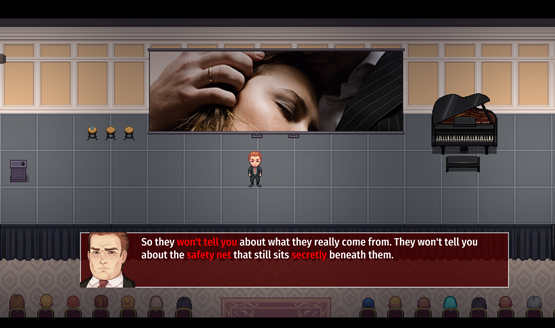
Life is full of ups and downs and complications, but it doesn’t have to be the fanatical mess that this game makes it out to be. Yet, by even getting me to talk about life, happiness, and hope, maybe Little Red Lie is doing exactly what it set out to do. Maybe in my utter contempt for how depressing and pessimistic this game is, it has only reinforced in me that hope and joy that I feel for my own life. I hated playing through it, but I can’t stop thinking about it. I’ll continue to think about it with every little white lie that I tell. Maybe, just maybe, it will help with my own self awareness.
Little Red Lie is real—perhaps too real—and will definitely strike some chords with people who have found themselves in similar experiences. Whether the payoff of the story will benefit or harm those people it touches is hard to say, but it will take a strong person to stomach the emotional black hole that Little Red Lie dives headfirst into. This isn’t casual interactive entertainment. In fact, it’s hardly interactive at all (and the entertainment part is totally subjective). You’ll mostly be mashing the X button to read through the misery and the lies, with no real choice involved (until the meta-ending). Will O’Neill might be a great—if depressing—writer, but creating compelling gameplay is another story entirely.
You’ll be helping Sarah fall deeper into a dysfunctional feeling of worthlessness as her family falls apart through debt, sickness, and death. You’ll help Arthur assault a man, rape a woman, and then climb back into his gold lined safety net before he can truly feel any negative effects from the fallout. The illusion of choice along the way is just that—a farce. But again, is this exactly the message the game is trying to send?
The Uncertain Lie
The “game” suffers from a weird imbalance of pixel art environments, static artistic renderings of scenes, and black backgrounds with walls of text that fill them. I had hoped that the interesting art style might permeate more scenes in the game, but it ends up feeling woefully underutilized in the middle, appearing largely only in Sarah’s story during the first and last hours of gameplay. In that way, it feels like there was a lot left unfinished, and again serves to highlight the long run time of the full experience. If this was the final cut, I’d hate to see what actually hit the cutting room floor.
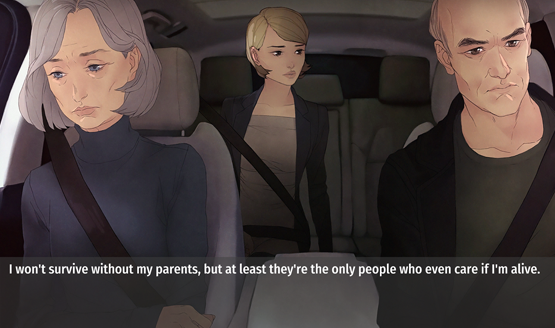
Cut Little Red Lie’s length in half and dial up the subtlety in the plot, and I think it really could have been a great black mirror into the world today. What it did do was instill a sense that I am better than either of these people that I was forced to spend time with. Little Red Lie is not a good game. There’s hardly what one would call a “game” here at all, but the experience could prove to be valuable, if you can stomach rampant pessimism and negativity. I’m having a very hard time parsing exactly how I feel about Little Red Lie. As a game, it’s imbalanced, awkward, and boring. I don’t think I can recommend it to anyone, but I might have been glad to have gone through it? It’s certainly an experience I will never forget, but then again, so was getting run over by a car.
Little Red Lie review code provided by developer. Version 1.00 reviewed on Standard PS4. For more information on scoring, please read our Review Policy.
-
It's on Vita! Take pessimism on the go!
-
Unforgettable and deeply emotional
-
Treads an exceptionally dark, but reality reflecting narrative
-
Lacks cohesion or restraint at times
-
Beautiful art isn't used nearly enough
-
There's not much of an interactive game here
-
Overstays its welcome
